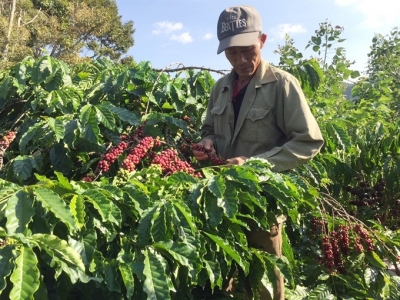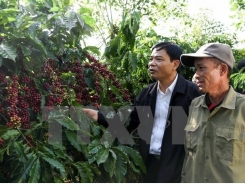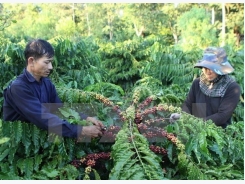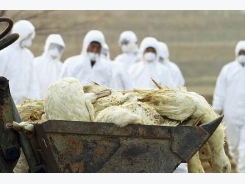Vietnam coffee industry has huge potential: seminar

Nguyễn Đăng Tỉnh, a coffee farmer in Nam Ban town, Lâm Đồng Province, harvests his coffee crop. — VNS Photo
Ho Chi Minh CITY — The Vietnamese coffee industry has great potential to develop considering the size of the global market and the country’s small share in it, according to the Ministry of Agricultural and Rural Development.
Speaking at a seminar on the New Development Period of Việt Nam’s Coffee Industry in Đà Lạt, Agriculture minister Nguyễn Xuân Cường said: “The global coffee-based beverage market is worth US$500 billion a year while Việt Nam’s exports account for just $3.4 billion. So there is room for the country to increase exports.
“In addition, with nearly 100 million people, of whom 65 per cent are young, the domestic market also has great potential.”
José Sette, executive director of the International Coffee Organisation, said there is enormous potential for growth in coffee demand, especially in countries with large populations like China, India and Indonesia, since “per capita rates in these markets were still well below those in traditional markets.”
Lương Văn Tự, chairman of the Việt Nam Coffee Association, said Việt Nam has been the world’s second largest coffee producer and exporter since the early 2000s.
Its exports of roasted and ground coffee and soluble coffee accounted for only 10 per cent last year, he said.
But the coffee sector is facing several problems like small scale of production, ageing coffee trees, poor quality control, and outdated processing technologies.
Some 150,000ha need to be replanted in the next five, a big challenge for the sector, he said.
To retain the country’s position of second largest coffee producer and exporter, the sector plans comprehensive measures such as enhancing coffee replanting programmes, research to develop new high-quality seedlings, investing more in roasted and ground coffee and soluble coffee, building brands for Vietnamese coffee and speeding up trade promotion activities in the local and foreign markets, he said.
Cường said: “The coffee sector will not expand the area under cultivation until 2030 but it will focus on improving value addition and productivity and linkages in the value chain and enhancing processing.”
PPP models
According to the ministry, as the country increasingly integrates globally and restructures its agriculture, public-private partnerships (PPP) will become inevitable for sustainable farming.
Speaking at another seminar held in Đà Lạt on Sunday to discuss effective partnership models, deputy agriculture minister Lê Quốc Doanh said in the past eight years his ministry has organised successful PPP programmes for seven different crops, including coffee, tea, vegetables, and rice.
“Businesses actively participated in all stages of the value chain.”
For instance, in the coffee sector, PPP projects have helped improve quality and productivity, bring farmers greater incomes and enable the sector to produce more coffee meeting the international 4C (Common Code for the Coffee Community) standards for export.
An active player in the Việt Nam coffee sector, Swiss company Nestlé has deployed the NESCAFÉ Plan in Central Highlands provinces since 2011 to help farmers replant ageing coffee shrubs, improving coffee quality and productivity and farmers’ incomes.
Since 2011 the project has, with the co-operation of the Western Highlands Agriculture and Forestry Science Institute (WASI), distributed over 20 million disease-resistant high-yield coffee seedlings to farmers.
It has also provided technical training to more than 200,000 farmers and helped 21,000 households obtain the 4C international coffee standard.
The farmers were taught smart use of fertilisers, how to make fertilisers from the skin of coffee beans, and water-efficient irrigation.
Nestle has also co-operated with the National Agricultural Extension Centre and EDE Consulting to develop a GAP manual for sustainable coffee production and distributed it to more than 50,000 coffee farmers and partners.
Nguyễn Đăng Tỉnh, a farmer in Nam Ban town in Lâm Đồng Province who participated in NESCAFÉ Plan in 2014, said adopting its techniques improved his coffee productivity by 10-15 per cent to 5.5-7 tonnes per hectare, while earnings went up by 20 per cent a year.
Ganesan Ampalavanar, managing director of Nestlé Việt Nam, the biggest buyer of Vietnamese coffee, said Việt Nam has a role to play not just as a supplier of coffee but a supplier of good quality coffee.
“I think we need to move from quantity to quality and increase the strength of the Vietnamese brand of coffee.
“Today Vietnamese coffee is known but its brand is not as strong it should be. So by improving the quality image and the brand image of Vietnamese coffee, Việt Nam can command premiums and increase value addition.”
The two seminars were organised within the framework of the first Việt Nam Coffee Day Festival held in Đà Lạt from December 9 to 11 by the ministry and Lâm Đồng Province in collaboration with other organisations.
Related news
Tools

Phối trộn thức ăn chăn nuôi

Pha dung dịch thủy canh

Định mức cho tôm ăn

Phối trộn phân bón NPK

Xác định tỷ lệ tôm sống

Chuyển đổi đơn vị phân bón

Xác định công suất sục khí

Chuyển đổi đơn vị tôm

Tính diện tích nhà kính

Tính thể tích ao




 Food management a top concern
Food management a top concern  South Korea confirms H5N6 bird flu at duck…
South Korea confirms H5N6 bird flu at duck…